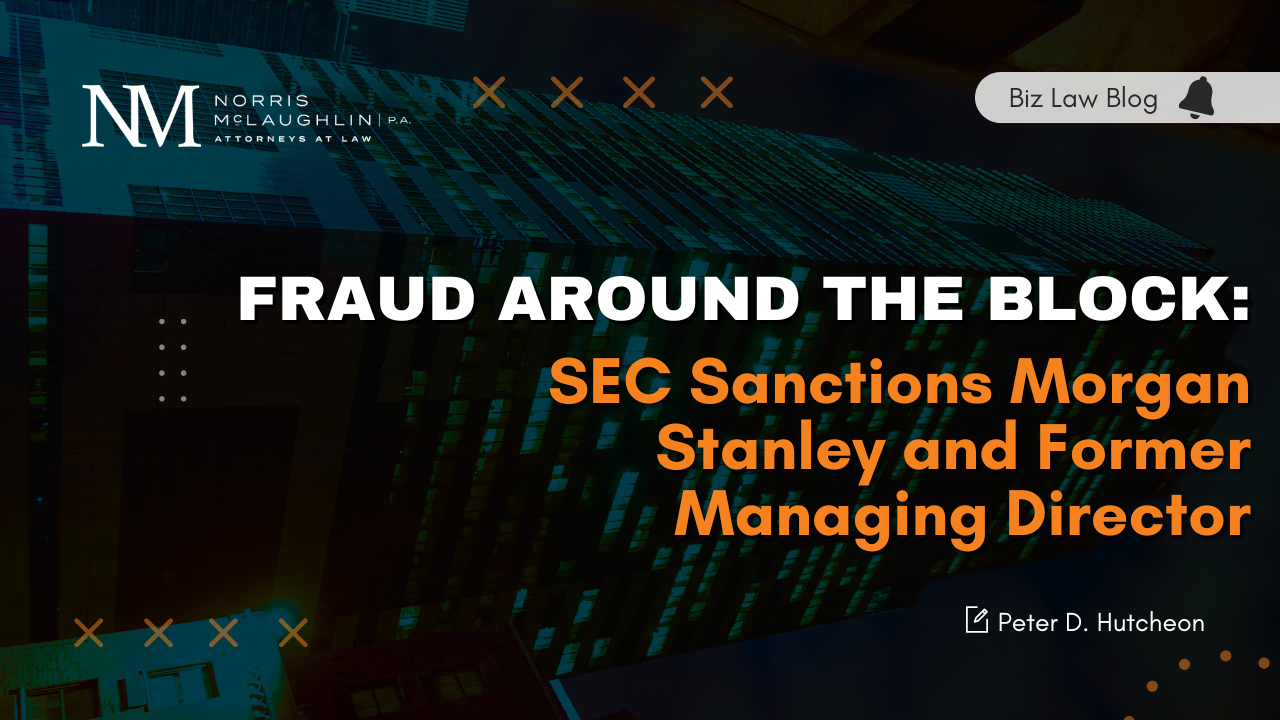What’s in a Name? The SEC Warns Against Confusion in ESG Investments

On March 4, 2021, the U.S. Securities and Exchange Commission (“SEC”) announced the formation of a “Climate and ESG Task Force” in the Division of Enforcement to identify and prosecute misconduct in selling Environmental, Social, and Corporate Governance (“ESG”) products and strategies. The SEC has noted that as threats from climate change have risen, investors have become much more likely to take sustainability and environmental damage into account when making decisions regarding ESG investments. At the same time, investors are also looking to assess the social policies of companies, including racial and gender equity.
The SEC Press Release states that the Task Force will seek to detect material gaps and misstatements in corporate disclosures. This action was followed on March 15, 2021, with a request from the SEC’s then Acting Chair for comments on the adequacy of required climate disclosure; see my March 25, 2021, blog post, “Beware the Ides of March: SEC Requests Comments on Climate Disclosure.” Then on April 9, 2021, the SEC’s Division of Examinations (“EXAM”) issued a Risk Alert titled “Review of ESG Investing.”
ESG Investments
In The Wall Street Journal for Saturday-Sunday, April 17-18, Jason Zweig’s “Intelligent Investor” column entitled “You Want to Go Green. Wall Street Smells Opportunity,” page B 5, col. 1, informs us that in the first quarter of 2021, $14.8 billion of new money flowed into ESG Exchange Traded Funds (“ETF’s”) and that in 2020, one-quarter of all the new money entering the market was invested in ESG ETF’s and mutual funds. Zweig discusses the adequacy of disclosures concerning emissions and notes that they can be “unreliable.” He then observes:
ESG funds are Wall Street’s latest way to take something old, call it new and jack up the price. Greenness is largely in the eye of the beholder. Fees always put investors in the red. So the SEC is seeking to help investors by policing the marketing efforts of issuers and packagers.
One of the points stressed in Zweig’s column is the amorphousness of the ESG concept; there is no clear definition. This is true despite the applicability of the so-called Names Rule, Rule 35d-1 under the Securities Exchange Act of 1934, as amended, which prohibits the use of fund names that mislead investors. But what is in the Name? The SEC staff has observed that some funds treat ESG as a strategy (so that the Names Rule does not apply); while others treat ESG as a class of investments, to which the Rule does apply.
The SEC Warning
The Risk Alert makes clear that examiners will be looking at a number of key items:
- The presence or absence of policies and procedures to identify ESG investments, especially when any claim of formal evaluation and selection processes are made
- Having policies and procedures NOT reasonably designed to prevent violations of law, selections of investments not meeting the espoused criteria, or failure to implement the policies and procedures
- Unclear or “weak” documentation of ESG investment designations
- Inadequate compliance programs to guard against inaccurate disclosures and/or marketing materials
- Portfolio management inconsistent with ESG disclosures
- Inaccurate and/or overstated marketing materials
- False claims of involvement in structuring ESG products
- False claims that the advisor recommends investments in only companies with ”high employee satisfaction”
- Inadequate systems to track client’s negative wishes
- Failure to implement systems to favor particular industries and/or issuers despite touting that capacity
- Failure to vote proxies consistent with client expressed wishes
- Inadequate compliance review of ESG claims
- Lack of policies and procedures to oversee sub-advisors
- Relying on third-party (including sub-advisor) composite scores, rather than assessing each of E, S, and G in any specific investment
- Compliance programs with inadequately trained and skilled personnel
On the other hand, the Risk Alert extols certain practices:
- Disclosures that are “clear, precise and tailored to actual ESG practices,” particularly ones that follow global ESG frameworks FAITHFULLY
- Having detailed policies and procedures addressing ESG investing, including specific documentation of ESG factors in making investment recommendations and/or decisions
- Having compliance personnel knowledgeable about ESG matters
What’s in a Name?
It is noteworthy that Commissioners Peirce and Roisman, in a March 4 Public Statement concurrent with the Press Release announcing the establishment of the Task Force, that this is “a continuation of the status quo with a new public relations twist.” This position was reiterated by Commissioner Peirce in an April 12 Public Statement that the Risk Alert raises no new questions under the Federal securities laws, but rather the SEC examiners would be looking for “consistency between claims and practice.”
The Risk Alert concludes by “encouraging” firms to:
- Evaluate their disclosures and marketing materials
- Ensure that their approaches are in effect firm-wide, covered in policies and procedures, and subject to regular oversight
- Consider documenting the firm’s efforts at compliance and maintaining those records for review by EXAM
The Risk Alert is a fair warning that market developments and aggressive marketing may bring their just due; and that “What’s in a Name?” may NOT smell as sweet (as a rose), with a consequential meeting with the Task Force. It may be helpful to engage counsel to assist in carrying out the steps encouraged by the Risk Alert.
If you have any questions about this post or any other related securities or general business law matters, please feel free to contact me at pdhutcheon@norris-law.com.




